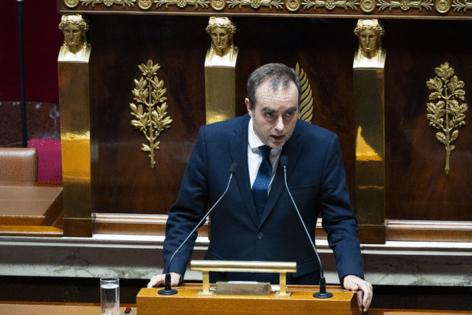French Premier Lecornu wins crucial Socialist Party backing
Published in News & Features
PARIS — Prime Minister Sebastien Lecornu won the crucial support of the Socialist Party in France’s National Assembly, significantly improving the chances of his new government surviving two no-confidence votes Thursday.
The Socialists, who hold leverage in the lower house of parliament, said they won’t vote to topple Lecornu’s fledgling government this week after Lecornu proposed suspending a pension law that raises the retirement age, a condition for the party’s support.
“We’re making a bet, a risky bet,” Boris Vallaud, the head of the Socialists in the lower house of parliament, told lawmakers Tuesday. “If we are all committed to the republic, we must take the gamble of offering the country a fair budget.”
After French President Emmanuel Macron called a snap election last year, the National Assembly was fragmented and the center diminished. No political group has a majority, but the Socialists wield outsize influence as they have enough seats to be pivotal in no-confidence votes.
France’s 10-year yield fell seven basis points to 3.40%, the lowest since mid-August, reducing the premium over German peers to the lowest in nearly a month. The spread closed five basis points tighter on Tuesday at 79 basis points, one of its biggest daily drops this year.
France’s CAC 40 benchmark closed the session 0.2% lower, after reversing most of the day’s losses. The index had fallen as much as 1.4% in early trading.
Lecornu made the concession on the pension law as his premiership hangs by a thread. He resigned eight days ago amid infighting within his cabinet, before accepting a new mandate on Friday. Macron gave him “carte blanche” to navigate a path out of the crisis.
Marine Le Pen’s far-right National Rally as well as the far left have vowed to try to topple him in no-confidence votes that will be held Thursday morning.
“Some would like to see this parliamentary crisis turn into a crisis of the regime,” Lecornu said. “That will not happen thanks to the institutions of the Fifth Republic and its supporters.”
Macron’s grip on power has weakened dramatically since his ill-fated gamble on snap elections last year, which delivered a parliament fractured between irreconcilable blocs.
Lawmakers already forced both of Lecornu’s predecessors — Michel Barnier and Francois Bayrou — to resign over their plans to rein in what has become the largest budget deficit in the euro area. If the National Assembly forces out Lecornu later this week, Macron has told ministers it would amount to a “dissolution motion,” indicating he could dissolve parliament and call fresh elections.
Lecornu has said his sole mission is to get a budget for France, but acknowledged he must allow lawmakers greater sway over the bill and other policies in order to avert another government collapse.
“France must have a budget, because there are urgent measures that must be taken without delay,” Lecornu said Tuesday.
The draft budget presented to parliament Tuesday targets a reduction in the deficit to 4.7% of economic output from 5.4% this year. Two thirds of the adjustment is based measures to curb spending, including unpopular freezes of pension and welfare payments.
The draft also includes an extension of what was originally a temporary increase in corporate tax for the largest firms, a levy for the highest earners, and a new tax on wealth in holding companies. The government expects €6.5 billion in total from those measures.
Lecornu said lawmakers are free to amend those plans, but the resulting deficit should be no wider than 5% of economic output.
“Your text can be amended and we will do that,” Vallaud said. “Your starting line won’t be our finish line.”
In recent weeks, Macron’s allies including Elisabeth Borne — the prime minister who pushed through the pension overhaul — have urged Lecornu and Macron to cede to opposition demands. Economist Philippe Aghion, who advised Macron on his economic program for the 2017 election and won the Nobel Prize this week, has also said the changes should be put on hold until the 2027 election.
“It’s simply stopping the clock for a year,” he said on France 2 television Monday. “I don’t know if the word ‘suspension’ is scary, but it’s clear that’s what needs to be done, it’s the way to calm things down.”
A full suspension would cost €400 million next year and €1.8 billion in 2027, according to Lecornu.
“We live and will continue to live in a time of crisis,” Lecornu said. “We can either suffer through it or use it to our advantage. We can either change or be changed.”
---------
—With assistance from James Regan, Alice Gledhill and Blaise Robinson.
©2025 Bloomberg L.P. Visit bloomberg.com. Distributed by Tribune Content Agency, LLC.







Comments